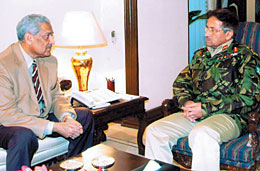ISLAMABAD, 5 February 2004 — In a dramatic turn of events, the father of Pakistan’s nuclear bomb, Dr. Abdul Qadeer Khan, yesterday admitted his responsibility in the transfer of nuclear technology to Iran, Libya and North Korea and sought presidential clemency.
“I have chosen to appear before you to offer my deepest regrets and unqualified apologies to a traumatized nation,” Khan said in a solemn speech broadcast on state TV. “I take full responsibility for my actions and seek your pardon.” He absolved the government of any involvement.
Earlier, Khan met President Gen. Pervez Musharraf at the president’s office in Rawalpindi. The government said Khan — long regarded as a national hero — requested clemency in a “mercy petition” to Musharraf, considering the services he had rendered to the nation.
Khan said he admitted involvement in leaks of nuclear technology after being confronted with evidence from Pakistani investigators, who launched their probe in November after Iranian revelations to the UN nuclear watchdog.
“The investigations have established that many of the reported activities did occur and these were inevitably initiated at my behest,” Khan said, whose statement cut into normal programming.
“In my interviews with the concerned officials I was confronted with the evidence and the findings and I have voluntarily admitted that much of it is true and accurate.
“The president was extremely kind and understanding... I explained to him all things. I gave him the background, what is happening, what had happened and he appreciated the frankness” Khan added.
Khan urged the nation not to politicize the issue.
Earlier a government statement quoted Khan as saying he “realized these activities, which were in clear violation of Pakistani laws, could have seriously jeopardized Pakistan’s nuclear capability and put the nation at risk”.
A meeting of the National Command Authority that controls Pakistan’s nuclear assets later decided to refer Khan’s plea for mercy to the federal Cabinet, an official statement said.
Despite it being a holiday today, Prime Minister Mir Zafarullah Khan Jamali has summoned the Cabinet to discuss the issue.
The decision last Saturday to remove Khan from his post as advisor to the prime minister on strategic affairs was also taken during an NCA meeting, after which the nuclear scientist was placed virtually under house arrest.
Musharraf is due to address the nation in the coming days to announce what action will be taken against Khan and the six other suspects in the case. The government has promised to take legal action against anyone proved of wrongdoing. However, analysts say a public prosecution could prove embarrassing to the government if it implicates top military figures.
Khan’s admissions have shocked many in Pakistan and raised questions about how he could have spread nuclear technology without the consent of the military — which has often ruled Pakistan since the country gained independence from Britain in 1947.
Two retired army chiefs have told investigators they did not authorize nuclear transfers. Musharraf and other government officials have repeatedly ruled out official involvement in proliferation.
A friend of the scientist said Tuesday that Khan told him he gave nuclear weapons technology to other countries with the full knowledge of top army officials, including Musharraf. Intelligence officials, speaking on condition of anonymity, said that as part of the understanding they reached not to prosecute Khan, the scientist agreed to cooperate with investigators and give them all the required information for their probe into the nuclear transfers.


